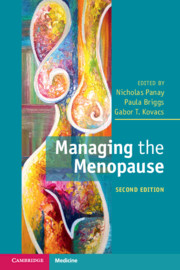Book contents
- Managing the Menopause
- Managing the Menopause
- Copyright page
- Contents
- Contributors
- Foreword
- Chapter 1 Physiology of the Menstrual Cycle and Changes in the Perimenopause
- Chapter 2 Clinical Features of the Menopause/Postmenopause
- Chapter 3 The Ovarian Reserve
- Chapter 4 Premature Ovarian Insufficiency
- Chapter 5 Premature Ovarian Insufficiency
- Chapter 6 Natural Hormone Replacement Therapy after Menopause by Ovarian Tissue Transplantation
- Chapter 7 Migraine in the Menopause
- Chapter 8 Psychological Aspects of the Menopause
- Chapter 9 Memory and Mood in the Menopause
- Chapter 10 Libido and Sexual Function in the Menopause
- Chapter 11 Vulvo-Vaginal Atrophy (VVA)
- Chapter 12 Pelvic Floor, Urinary Problems and the Menopause
- Chapter 13 The Effect of Menopause on the Musculoskeletal System
- Chapter 14 Hormonal Management of Osteoporosis during the Menopause
- Chapter 15 Cardiovascular Disease and the Menopause
- Chapter 16 Gynecological Pathology in the Menopause (Excluding Cancers)
- Chapter 17 Nutrition and Weight Gain in the Menopause
- Chapter 18 The Use of Estrogens and Progestogens in Menopausal Hormone Therapy
- Chapter 19 Androgen Therapy for Postmenopausal Women
- Cahpter 20 Contraception for the Perimenopausal Woman
- Chapter 21 Hormone Therapy and Cancer
- Chapter 22 Menopausal Hormone Therapy (MHT) and Venous Thrombosis
- Chapter 23 The Risk–Benefit Analysis of Menopausal Hormone Therapy in the Menopause
- Chapter 24 Selective Estrogen Receptor Modulators (SERMs) and Menopausal Hormone Therapy (MHT)
- Chapter 25 Non-hormonal Treatments for Menopausal Symptoms
- Chapter 26 Alternative Therapies for the Management of Menopausal Symptoms
- Chapter 27 Menopause in Primary Care
- Index
- References
Chapter 1 - Physiology of the Menstrual Cycle and Changes in the Perimenopause
Published online by Cambridge University Press: 18 June 2020
- Managing the Menopause
- Managing the Menopause
- Copyright page
- Contents
- Contributors
- Foreword
- Chapter 1 Physiology of the Menstrual Cycle and Changes in the Perimenopause
- Chapter 2 Clinical Features of the Menopause/Postmenopause
- Chapter 3 The Ovarian Reserve
- Chapter 4 Premature Ovarian Insufficiency
- Chapter 5 Premature Ovarian Insufficiency
- Chapter 6 Natural Hormone Replacement Therapy after Menopause by Ovarian Tissue Transplantation
- Chapter 7 Migraine in the Menopause
- Chapter 8 Psychological Aspects of the Menopause
- Chapter 9 Memory and Mood in the Menopause
- Chapter 10 Libido and Sexual Function in the Menopause
- Chapter 11 Vulvo-Vaginal Atrophy (VVA)
- Chapter 12 Pelvic Floor, Urinary Problems and the Menopause
- Chapter 13 The Effect of Menopause on the Musculoskeletal System
- Chapter 14 Hormonal Management of Osteoporosis during the Menopause
- Chapter 15 Cardiovascular Disease and the Menopause
- Chapter 16 Gynecological Pathology in the Menopause (Excluding Cancers)
- Chapter 17 Nutrition and Weight Gain in the Menopause
- Chapter 18 The Use of Estrogens and Progestogens in Menopausal Hormone Therapy
- Chapter 19 Androgen Therapy for Postmenopausal Women
- Cahpter 20 Contraception for the Perimenopausal Woman
- Chapter 21 Hormone Therapy and Cancer
- Chapter 22 Menopausal Hormone Therapy (MHT) and Venous Thrombosis
- Chapter 23 The Risk–Benefit Analysis of Menopausal Hormone Therapy in the Menopause
- Chapter 24 Selective Estrogen Receptor Modulators (SERMs) and Menopausal Hormone Therapy (MHT)
- Chapter 25 Non-hormonal Treatments for Menopausal Symptoms
- Chapter 26 Alternative Therapies for the Management of Menopausal Symptoms
- Chapter 27 Menopause in Primary Care
- Index
- References
Summary
The menopause marks the permanent cessation of menstruation and heralds the transition in a woman’s life from a reproductive state to a non-reproductive one. Whilst the average age of this landmark varies slightly across the world, the menopause generally occurs in the early fifties and is only truly affected by factors such as smoking and medical and surgical induction of the menopausal state. However, clinical symptoms may precede this, and the physiological changes which occur with the menopausal transition may begin several years prior to the onset of any manifestations. The basis of the clinical and biochemical changes associated with the perimenopausal period is the depletion of ovarian follicles to a critical level.
- Type
- Chapter
- Information
- Managing the Menopause , pp. 1 - 11Publisher: Cambridge University PressPrint publication year: 2020



